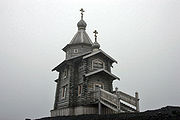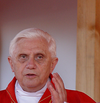
Christianity in the 21st century
Encyclopedia

Secularization
Secularization is the transformation of a society from close identification with religious values and institutions toward non-religious values and secular institutions...
. Christian missions continue on a large scale but no longer originate predominantly from Europe which was the situation in the 19th and early 20th centuries.
Benedict XVI

Pope Benedict XVI
Benedict XVI is the 265th and current Pope, by virtue of his office of Bishop of Rome, the Sovereign of the Vatican City State and the leader of the Catholic Church as well as the other 22 sui iuris Eastern Catholic Churches in full communion with the Holy See...
in 2005, the Church has so far seen largely a continuation of the policies of his predecessor, John Paul II, with some notable exceptions. Benedict decentralized beatifications and reverted the decision of his predecessor regarding papal elections. In 2007, he set a Church record by approving the beatification of 498 Spanish Martyrs
498 Spanish Martyrs
The 498 Spanish Martyrs were victims of the Spanish Civil War beatified by the Roman Catholic Church in October 2007 by Pope Benedict XVI. It was the greatest numbers of persons ever beatified in the Church's 2000-year history. They originated from all parts of Spain. Their ages ranged from 15...
. His first encyclical Deus Caritas Est
Deus Caritas Est
Deus Caritas Est is a 2006 encyclical—the first written by Pope Benedict XVI, in large part derived from writings by his late predecessor, Pope John Paul II. Its subject is love, as seen through a Christian perspective, and God's place within all love...
discussed love
Love
Love is an emotion of strong affection and personal attachment. In philosophical context, love is a virtue representing all of human kindness, compassion, and affection. Love is central to many religions, as in the Christian phrase, "God is love" or Agape in the Canonical gospels...
and sex
Sex
In biology, sex is a process of combining and mixing genetic traits, often resulting in the specialization of organisms into a male or female variety . Sexual reproduction involves combining specialized cells to form offspring that inherit traits from both parents...
in continued opposition to several other views on sexuality.
Roman Catholic attempts to improve ecumenical relations with the Eastern Orthodox Churches have been complicated by disputes over both doctrine and the recent history of the Orthodox Eastern Catholic Churches, involving the return of expropriatiated properties of the Eastern Catholic Churches, which the Orthodox Church took over after World War II
World War II
World War II, or the Second World War , was a global conflict lasting from 1939 to 1945, involving most of the world's nations—including all of the great powers—eventually forming two opposing military alliances: the Allies and the Axis...
at the request of Joseph Stalin
Joseph Stalin
Joseph Vissarionovich Stalin was the Premier of the Soviet Union from 6 May 1941 to 5 March 1953. He was among the Bolshevik revolutionaries who brought about the October Revolution and had held the position of first General Secretary of the Communist Party of the Soviet Union's Central Committee...
.
Major lawsuits emerged in 2001 claiming that priests had sexually abused minors.
Catholic-Orthodox dialogue
In June 2004, the Ecumenical Patriarch Bartholomew I's visit to Rome for the Feast of Saints Peter and PaulFeast of Saints Peter and Paul
The Feast of Saints Peter and Paul, or the Solemnity of Saints Peter and Paul, is a liturgical feast in honour of the martyrdom in Rome of the apostles Saint Peter and Saint Paul, which is observed on 29 June...
(29 June) afforded him the opportunity for another personal meeting with Pope John Paul II, for conversations with the Pontifical Council for Promoting Christian Unity
Pontifical Council for Promoting Christian Unity
The Pontifical Council for Promoting Christian Unity origins are associated with the Second Vatican Council which met intermittently from 1962–1965.Pope John XXIII wanted the Catholic Church to engage in the contemporary ecumenical movement...
and for taking part in the celebration for the feast day in St. Peter's Basilica
St. Peter's Basilica
The Papal Basilica of Saint Peter , officially known in Italian as ' and commonly known as Saint Peter's Basilica, is a Late Renaissance church located within the Vatican City. Saint Peter's Basilica has the largest interior of any Christian church in the world...
.
The Patriarch's partial participation in the Eucharistic liturgy at which the Pope presided followed the program of the past visits of Patriarch Dimitrios (1987) and Patriarch Bartholomew I himself: full participation in the Liturgy of the Word, joint proclamation by the Pope and by the Patriarch of the profession of faith according to the Nicene-Constantinopolitan Creed in Greek and as the conclusion, the final Blessing imparted by both the Pope and the Patriarch at the Altar of the Confessio. The Patriarch did not fully participate in the Liturgy of the Eucharist involving the consecration and distribution of the Eucharist
Eucharist
The Eucharist , also called Holy Communion, the Sacrament of the Altar, the Blessed Sacrament, the Lord's Supper, and other names, is a Christian sacrament or ordinance...
itself.
In accordance with the Roman Catholic Church's practice of including the clause when reciting the Creed in Latin, but not when reciting the Creed in Greek, Popes John Paul II and Benedict XVI have recited the Nicene Creed jointly with Patriarchs Demetrius I
Patriarch Demetrius I of Constantinople
Demetrios I also Dimitrios I or Demetrius I, born Demetrios Papadopoulos was the Ecumenical Patriarch of Constantinople from July 16, 1972, to October 2, 1991. Before his election as Patriarch he served as Metropolitan Bishop of Imvros...
and Bartholomew I in Greek without the Filioque clause. The action of these Patriarchs in reciting the Creed together with the Popes has been strongly criticized by some elements of Eastern Orthodoxy, such as the Metropolitan of Kalavryta, Greece, in November 2008
The declaration of Ravenna
Declaration of Ravenna
The Declaration of Ravenna is a Roman Catholic–Eastern Orthodox document issued in 2007 re-asserting that the bishop of Rome is indeed the Protos, although future discussions are to be held on the concrete ecclesiological exercise of papal primacy....
in 2007 re-asserted these beliefs, and re-stated the notion that the bishop of Rome is indeed the protos, although future discussions are to be held on the concrete ecclesiological exercise of papal primacy.
Protestantism
There are churches established every day in Africa and Asia. These groups are largely EvangelicalEvangelicalism
Evangelicalism is a Protestant Christian movement which began in Great Britain in the 1730s and gained popularity in the United States during the series of Great Awakenings of the 18th and 19th century.Its key commitments are:...
, Pentecostals, or Charismatics.
In February 2001, the United Methodist Church
United Methodist Church
The United Methodist Church is a Methodist Christian denomination which is both mainline Protestant and evangelical. Founded in 1968 by the union of The Methodist Church and the Evangelical United Brethren Church, the UMC traces its roots back to the revival movement of John and Charles Wesley...
organized the Saint Brigid of Kildare Monastery. It is a Methodist-Benedictine residential monastery for women in Collegeville, Minnesota.
Postmodern Christianity
Postmodern Christianity
Postmodern Christianity is an outlook of Christianity that is closely associated with the body of writings known as postmodern philosophy. Although it is a relatively recent development in the Christian religion, some Christian postmodernists assert that their style of thought has an affinity with...
has influenced the emerging church
Emerging Church
The emerging church is a Christian movement of the late 20th and early 21st century that crosses a number of theological boundaries: participants can be described as evangelical, Protestant, Catholic, post-evangelical, anabaptist, adventist, liberal, post-liberal, reformed, charismatic,...
movement. Critics allege, however, that this movement's understanding of faith has led many of its adherents outside the bounds of traditional Christianity.
See also
- History of ChristianityHistory of ChristianityThe history of Christianity concerns the Christian religion, its followers and the Church with its various denominations, from the first century to the present. Christianity was founded in the 1st century by the followers of Jesus of Nazareth who they believed to be the Christ or chosen one of God...
- History of Eastern Orthodox Churches in the 20th centuryHistory of Eastern Orthodox Churches in the 20th centuryThe Eastern Orthodox Churches trace their roots back to the Apostles and Jesus Christ. Apostolic succession established by the seats of Patriarchy . Eastern Orthodoxy reached its golden age during the high point of the Byzantine Empire, and then continued to flourish in Russia after the Fall of...
- History of ProtestantismHistory of ProtestantismThe Protestant Reformation of the early 16th century was an attempt to reform the Catholic Church.German theologian Martin Luther wrote his Ninety-Five Theses on the sale of indulgences in 1517. Parallel to events in Germany, a movement began in Switzerland under the leadership of Ulrich Zwingli...
- History of the Roman Catholic Church#Catholicism today
- History of Christian theology#Postmodern Christianity
- Timeline of Christianity#21st century
- Timeline of Christian missions#2000 to present
- Timeline of the Roman Catholic Church#21st century
Further reading
- Farrell, Joseph P. God, History, & Dialectic: The Theological Foundations of the Two Europes and Their Cultural Consequences. Bound edition 1997. Electronic edition 2008.
- Nichols, Aidan. Rome and the Eastern Churches: a Study in Schism. 1992
External links
- History of Christianity Reading Room: Extensive online resources for the study of global church history (Tyndale Seminary).
- Dictionary of the History of Ideas: Christianity in History
- Church History in the 1911 Encyclopædia BritannicaEncyclopædia BritannicaThe Encyclopædia Britannica , published by Encyclopædia Britannica, Inc., is a general knowledge English-language encyclopaedia that is available in print, as a DVD, and on the Internet. It is written and continuously updated by about 100 full-time editors and more than 4,000 expert...
- Historical Christianity, A time line with references to the descendants of the early church.
| History of Christianity History of Christianity The history of Christianity concerns the Christian religion, its followers and the Church with its various denominations, from the first century to the present. Christianity was founded in the 1st century by the followers of Jesus of Nazareth who they believed to be the Christ or chosen one of God... : Modern Christianity |
||||||||||
| Preceded by: Christianity in the 20th century Christianity in the 20th century Christianity in the 20th century was characterized by an accelerating secularization of Western society.Christian ecumenism grew in importance, beginning at the Edinburgh Missionary Conference in 1910, and accelerated after the Second Vatican Council of the Catholic Church, The Liturgical... |
21st Century 21st century The 21st century is the current century of the Anno Domini era or the Common Era in accordance with the Gregorian calendar. The century began on January 1, 2001 and will end on December 31, 2100. The years from 2001 to 2010 are historical; the years from 2011 to 2100 are subject to futurology and... |
Theology of the Last Things in Christianity Christian eschatology Christian eschatology is a major branch of study within Christian theology. Eschatology, from two Greek words meaning last and study , is the study of the end of things, whether the end of an individual life, the end of the age, or the end of the world... |
||||||||

